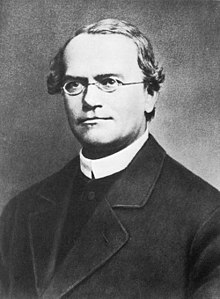
Back Gregor Mendel Afrikaans Gregor Mendel ALS ግሬጎር መንደል Amharic غريغور يوهان مندل Arabic جريجور مندل ARZ Gregor Mendel AST Qreqor Mendel Azerbaijani قرقور مندل AZB Грэгар Іаган Мендэль Byelorussian Грэгар Мэндэль BE-X-OLD
Gregor Mendel | |
|---|---|
 | |
| Born | Johann Mendel 20 July 1822 |
| Died | 6 January 1884 (aged 61) |
| Nationality | Austrian |
| Alma mater | University of Olomouc University of Vienna |
| Known for | Founder of the modern science of genetics |
| Scientific career | |
| Fields | Genetics |
| Institutions | St Thomas's Abbey, Brno |
| Ecclesiastical career | |
| Religion | Christianity |
| Church | Catholic Church |
| Ordained | 25 December 1846[1] |
| Signature | |
 | |
| Part of a series on |
| Genetics |
|---|
 |
Gregor Johann Mendel OSA (/ˈmɛndəl/; Czech: Řehoř Jan Mendel;[2] 20 July 1822[3] – 6 January 1884) was an Austrian[4][5] biologist, meteorologist,[6] mathematician, Augustinian friar and abbot of St. Thomas' Abbey in Brno (Brünn), Margraviate of Moravia. Mendel was born in a German-speaking family in the Silesian part of the Austrian Empire (today's Czech Republic) and gained posthumous recognition as the founder of the modern science of genetics.[7] Though farmers had known for millennia that crossbreeding of animals and plants could favor certain desirable traits, Mendel's pea plant experiments conducted between 1856 and 1863 established many of the rules of heredity, now referred to as the laws of Mendelian inheritance.[8]
Mendel worked with seven characteristics of pea plants: plant height, pod shape and color, seed shape and color, and flower position and color. Taking seed color as an example, Mendel showed that when a true-breeding yellow pea and a true-breeding green pea were cross-bred, their offspring always produced yellow seeds. However, in the next generation, the green peas reappeared at a ratio of 1 green to 3 yellow. To explain this phenomenon, Mendel coined the terms "recessive" and "dominant" in reference to certain traits. In the preceding example, the green trait, which seems to have vanished in the first filial generation, is recessive, and the yellow is dominant. He published his work in 1866, demonstrating the actions of invisible "factors"—now called genes—in predictably determining the traits of an organism.
The profound significance of Mendel's work was not recognized until the turn of the 20th century (more than three decades later) with the rediscovery of his laws. Erich von Tschermak, Hugo de Vries and Carl Correns independently verified several of Mendel's experimental findings in 1900, ushering in the modern age of genetics.[9][10]
- ^ Fr. Richter, Clemens OSA (2015). "Remembering Johann Gregor Mendel: a human, a Catholic priest, an Augustinian monk, and abbot". Molecular Genetics & Genomic Medicine. 3 (6): 483–485. doi:10.1002/mgg3.186. PMC 4694133. PMID 26740939.
- ^ Funeral card in Czech (Brno, 6. January 1884)
- ^ 20 July is his birthday, often mentioned as 22 July, the date of his baptism. "CV". Mendel Museum. Archived from the original on 10 April 2019.
- ^ De Castro, Mauricio (January 2016). "Johann Gregor Mendel: paragon of experimental science". Molecular Genetics & Genomic Medicine. 4 (1): 3–8. doi:10.1002/mgg3.199. PMC 4707027. PMID 26788542.
- ^ "Mendel, Johann (Gregor)". genome.gov. Archived from the original on 22 November 2024. Retrieved 22 November 2024.
- ^ Czech J. Genet. Plant Breed., 50, 2014 (2): 43–51
- ^ Klein, Jan; Klein, Norman (2013). Solitude of a Humble Genius – Gregor Johann Mendel. Volume 1, Formative years. Berlin: Springer. pp. 91–103. ISBN 978-3-642-35254-6. OCLC 857364787.
- ^ Schacherer, Joseph (2016). "Beyond the simplicity of Mendelian inheritance". Comptes Rendus Biologies. 339 (7–8): 284–288. doi:10.1016/j.crvi.2016.04.006. PMID 27344551.
- ^ Gayon, Jean (2016). "From Mendel to epigenetics: History of genetics". Comptes Rendus Biologies. 339 (7–8): 225–230. doi:10.1016/j.crvi.2016.05.009. PMID 27263362.
- ^ Corcos, Alain F.; Monaghan, Floyd V. (1990). "Mendel's work and its rediscovery: A new perspective". Critical Reviews in Plant Sciences. 9 (3): 197–212. Bibcode:1990CRvPS...9..197C. doi:10.1080/07352689009382287.